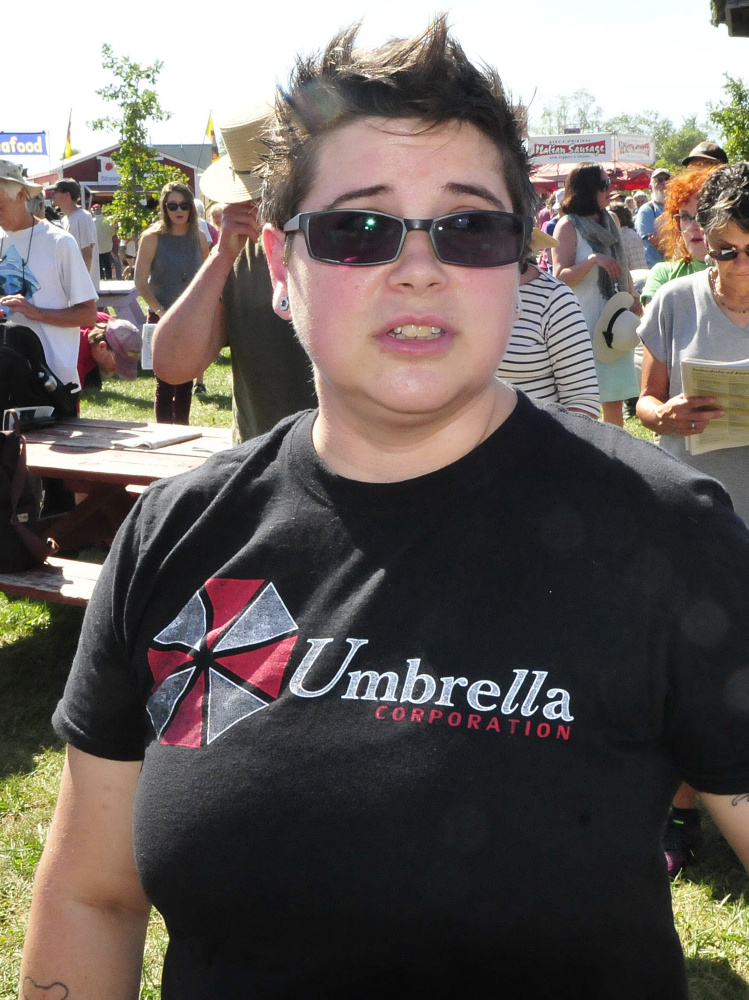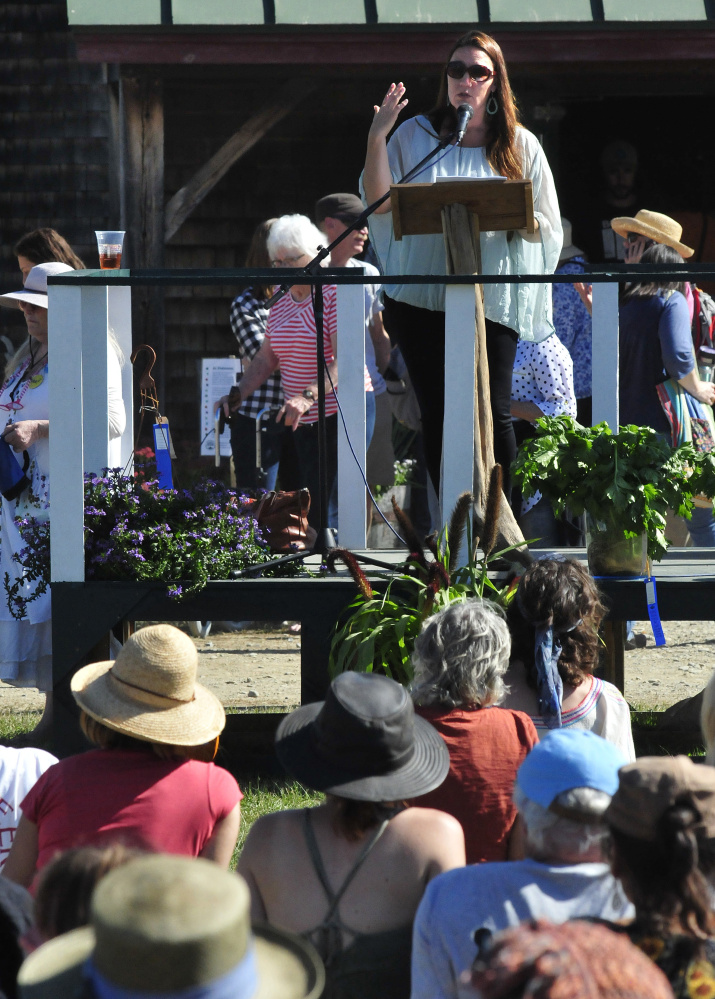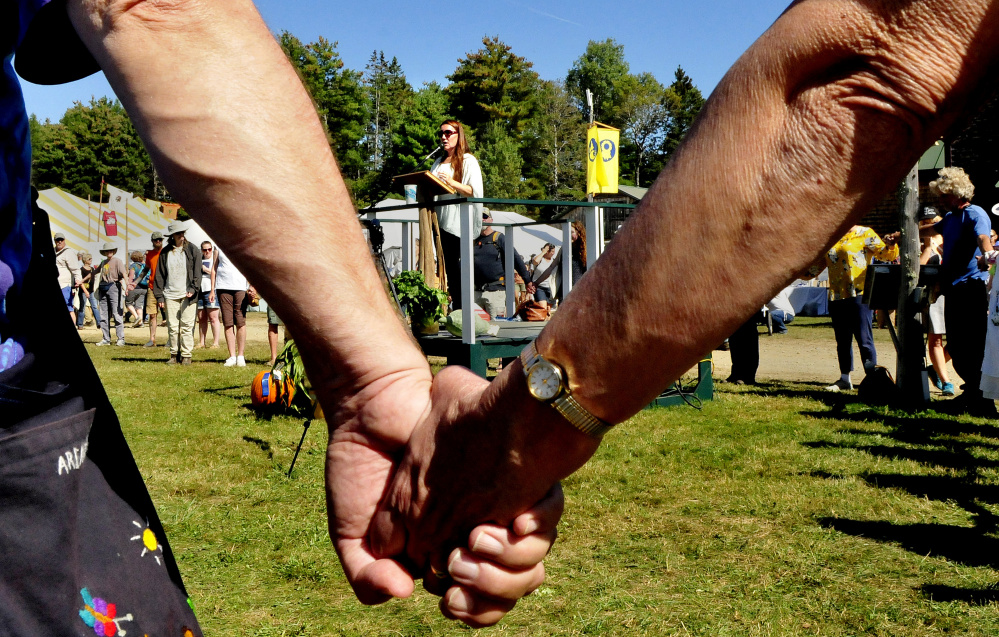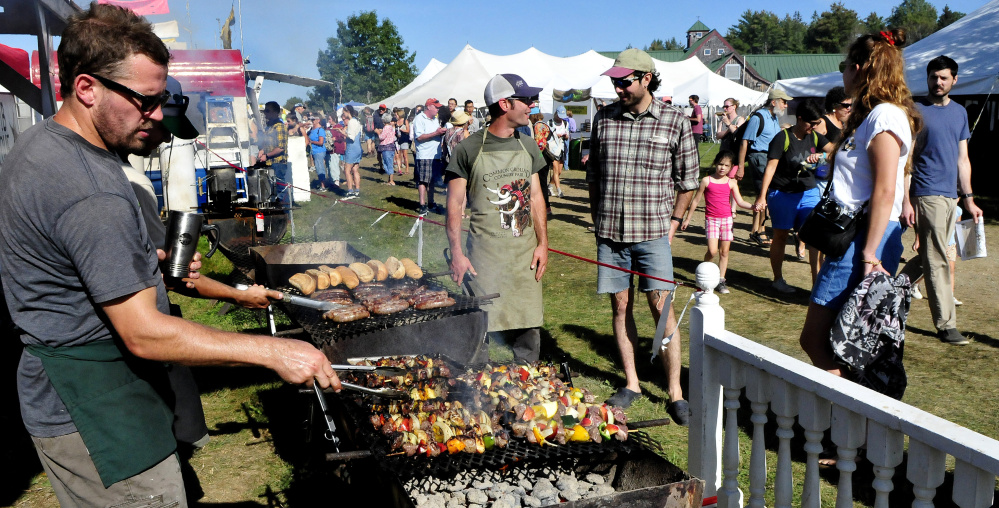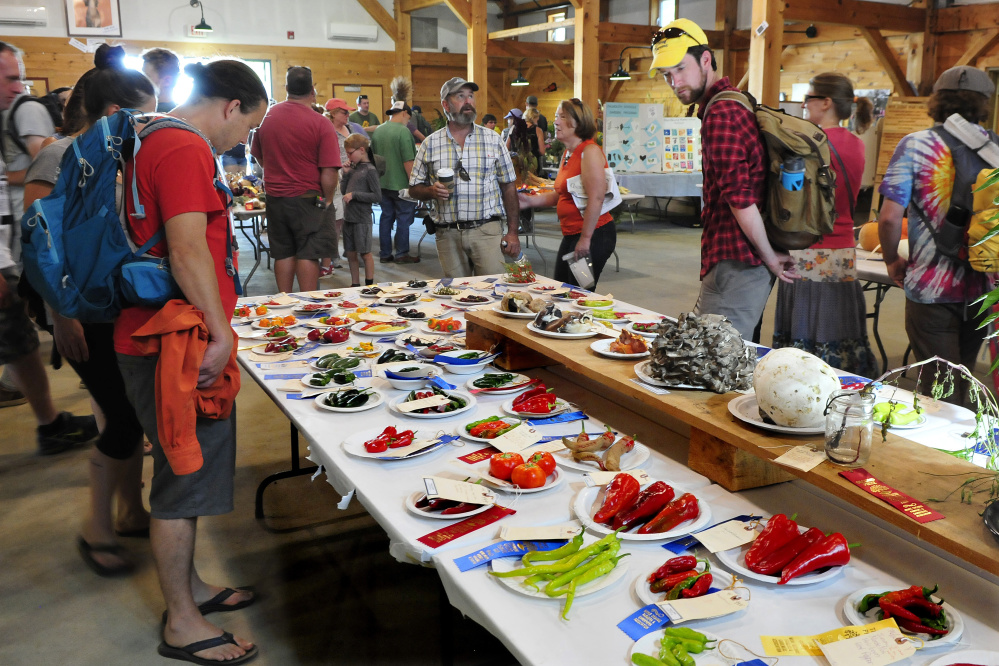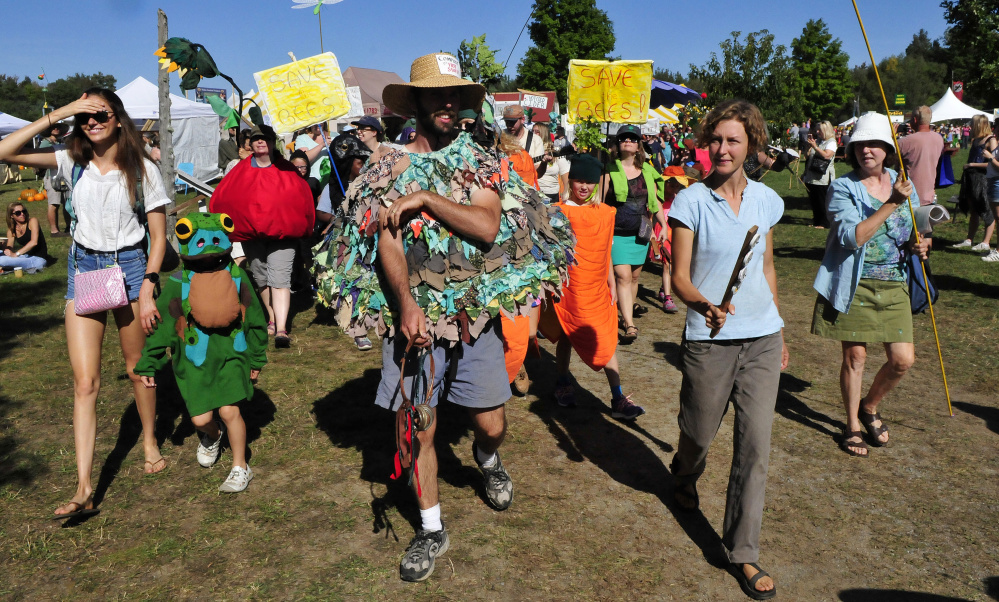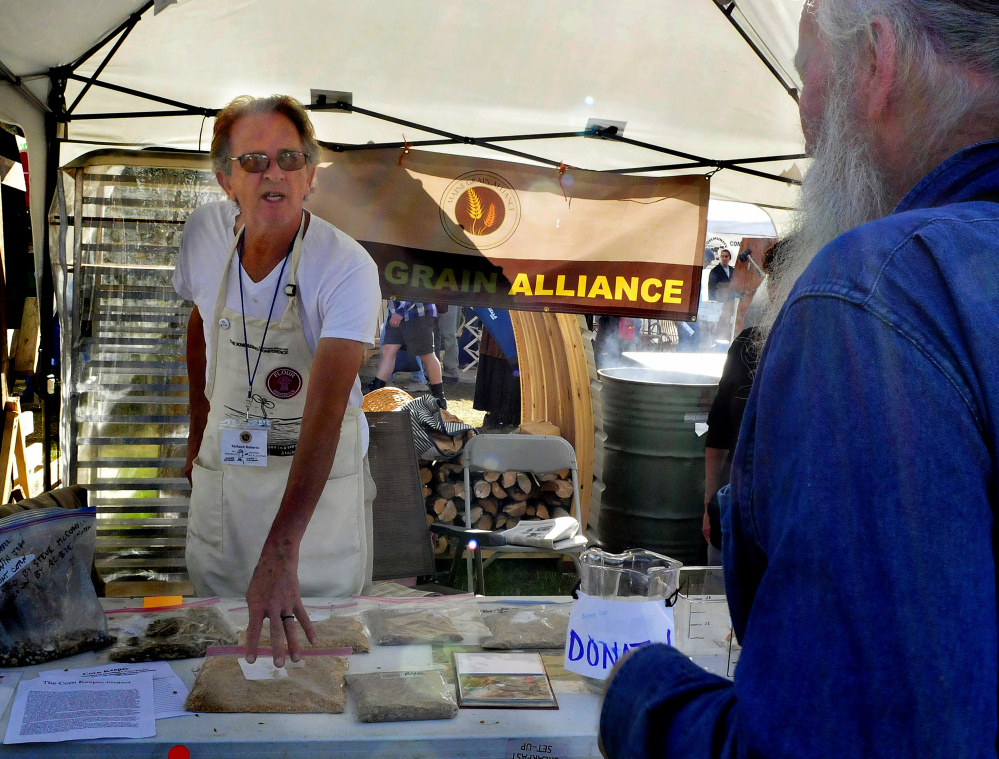UNITY — Sherri Mitchell’s speech about supporting indigenous people’s rights and protecting the Earth was compelling, but it was the end of her talk that left many in the audience speechless and tearful.
Mitchell, an indigenous rights attorney, teacher and spiritual activist, addressed several hundred people Saturday at the Common Ground Country Fair, saying this has been a difficult year for her family.
In January, her cousin disappeared and was found dead in the Penobscot River; and a week later, her nephew, who was a like a son to her, committed suicide.
Then at 2 a.m. Saturday, before she was to appear at the fair, another nephew took his own life, she said.
In Native American culture, the suicide rate is four times higher than the national average because of the unrelenting oppression people experience, according to Mitchell. Young people are not seeing a future for themselves because of repression and racism, she said.
Mitchell, who was born and raised on the Penobscot Indian reservation, asked the crowd to pray for her nephew’s father and little girl. She asked the audience to acknowledge that every life is valuable, and that people must connect with each other so that no one feels as if he or she is traveling alone.
“Acknowledge the preciousness of every, single life,” she said. “Please send prayers for the spirits of these lost young men.”
Mitchell, founding director of the Land Peace Foundation, an organization dedicated to protecting indigenous people’s rights and preserving their way of life, clearly was grieving. Her voice cracking. She asked each of those present to hold hands and look the next person in the eye.
“Tell them you are precious, you are important, you matter — and give them a hug,” she said.
Mitchell is the 2010 recipient of the Mahoney Dunn International Human Rights and Humanitarian Award for research into human rights violations against indigenous peoples. She also received the Spirit of Maine Award in 2015 for commitment and excellence in the field of international human rights. A longtime advisor to the American Indian Institute’s Healing the Future Program, Mitchell also advises the Indigenous Elders and Medicine People’s Council of North and South America and speaks all over the world.
She will be featured in the New Story documentary film “Dancing with the Cannibal Giant,” to be released late this fall, and is the author of “Sacred Instructions: Indigenous Wisdom for Spirit Based Change,” to be available in February 2018.
Before her talk and without immediately revealing why, Mitchell said Saturday was a challenging day for her.
“I wouldn’t have been here, except what we’re talking about today is important to me in a real heart-based way,” she said, adding that she wanted to honor the commitment she had made to fair attendees and share her worldview about connecting to the land and respecting and engaging in mindful relationship to that land.
Mitchell said setting a framework for creating a way of life that is in harmony with others and the Earth is important. Every living thing, she said, has its own language and its own stories and we must listen to them.
“Once we do, our worldview begins to change,” she said.
People were given the right to inhabit the Earth and must live in harmony with it and respect it, according to Mitchell. They must make conscious steps to honor the land and water they inhabit. Being complacent in the face of corporate greed and the destruction of the planet takes away our right to live on the planet, she said.
When her tribe decided the Penobscot River needed to be cleaned, members did not stand on a soapbox and complain about it; they worked in concert with others to take responsibility in cleaning it up, she said.
“We recognized if we wanted to claim rights for clean water for our people, then we had to take responsibility of cleaning the rivers for everyone.”
In acknowledging the tribe’s own rights, they acknowledged that their rights were tied to the rights of all other human beings, according to Mitchell.
“We can not claim a right to life without first taking responsibility for the lives that have already been created.”
People must work together to create the kind of world they want to live in, focusing less on blaming others, she said. Maintaining separateness from others is unnatural, according to Mitchell.
“Just because that’s become normal doesn’t mean it’s natural,” she said. “We must live in harmony with others and the world. That’s the impetus for the work that I do and that others do. The only thing we need to do right now is de-colonize our minds and let go of the illusion that someone else is going to come along and solve our problems for us.”
Mitchell urged people to attend a harvest festival from noon to 8 p.m. Oct. 15 that is being held as a fundraiser to help save Nibezun, a sacred ancestral land and healing center in Passadumkeag, in Penobscot territory.
After her talk, Kai Fast, 36, of Standish, took a moment to reflect on what Mitchell had said.
“It’s very heavy. I feel very emotional right now,” said Fast, a project manager and designer for BrightBuilt Home, of Portland, which was exhibiting at the fair.
Fast said she loved hearing Mitchell’s thoughts and ideas about the interconnectedness of people and the Earth, particularly in a world where people are so polarized. That polarization, Fast said, is fueled by the way people talk about hating others.
“Everyone’s hurting, and throwing stones at each other doesn’t help us to find solutions that will help everybody,” she said.
Thousands turned out in perfect, sunny, warm weather for the second day of the giant 41st Common Ground Fair, hosted by the Maine Organic Farmers and Gardeners Association.
Food vendors sold seafood, Italian sausage, strawberry shortcake, honey buns and other fare. Big white tents were packed with exhibitors selling pottery, jewelry, woven goods, wood carvings, folk art, paintings and other items. Fairgoers flocked to the farmers market to buy fresh produce and herbs, and people lined a fenced-in area to watch the sheepdog demonstrations.
Stone tool demonstrations, energy and shelter displays, electric cars and a sustainable construction program hosted by Kennebec Valley Community College were popular.
Under the Maine Fiddle Camp tent, people of all ages were singing. The music camp, in Montville, focuses on traditional Downeast fiddling in a traditional Maine summer camp setting. In Unity Hall, people were perusing photo and vegetable exhibits, patronizing the seed exchange and checking out the children’s apple pie contest.
A bicycle corral held hundreds of bicycles ridden by fairgoers who parked them there until they were ready to leave. Though thousands of people strolled through the fairgrounds, it was peaceful because of the lack of motorized vehicles. The only transportation-related sound was that of a train whistle from the Belfast and Moosehead Lake Railroad, which provided rides to and from parking areas in Unity and Thorndike.
Getting to the fair from the center of Unity was difficult at mid-morning, not because of any disorganization, but because so many vehicles were heading there. There was a sufficient number of volunteers and police directing traffic, which was bumper-to-bumper and slow-moving from Unity Raceway on School Street, right into the large fields that served as parking lots for the fairgrounds.
Amy Calder — 861-9247
Twitter: @AmyCalder17
Send questions/comments to the editors.


